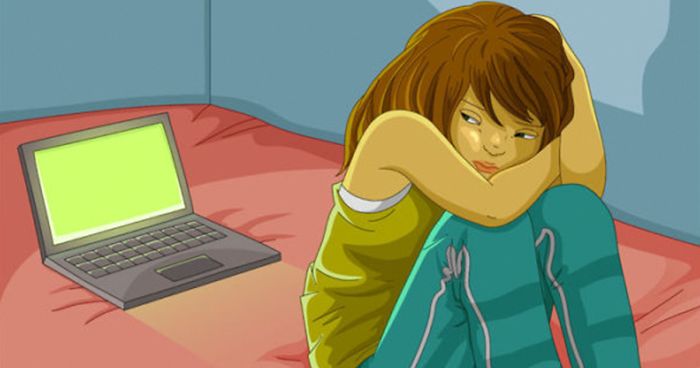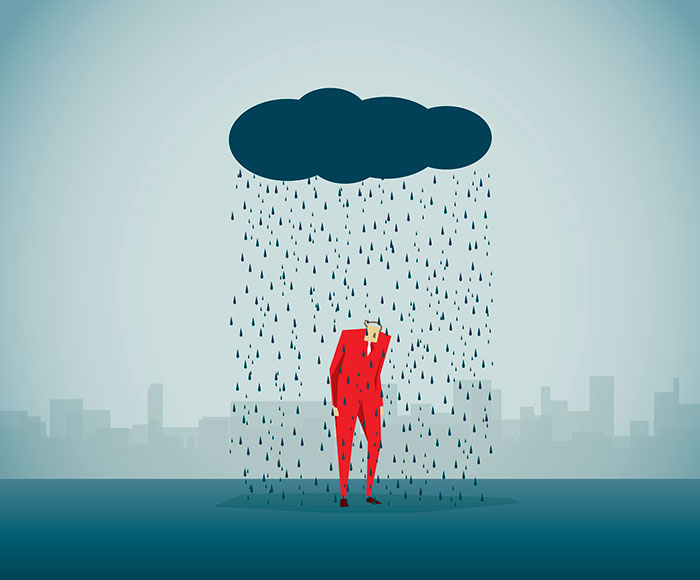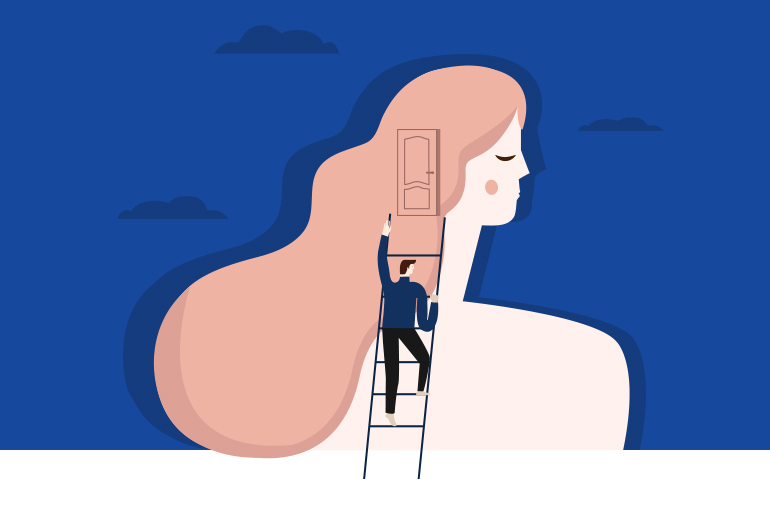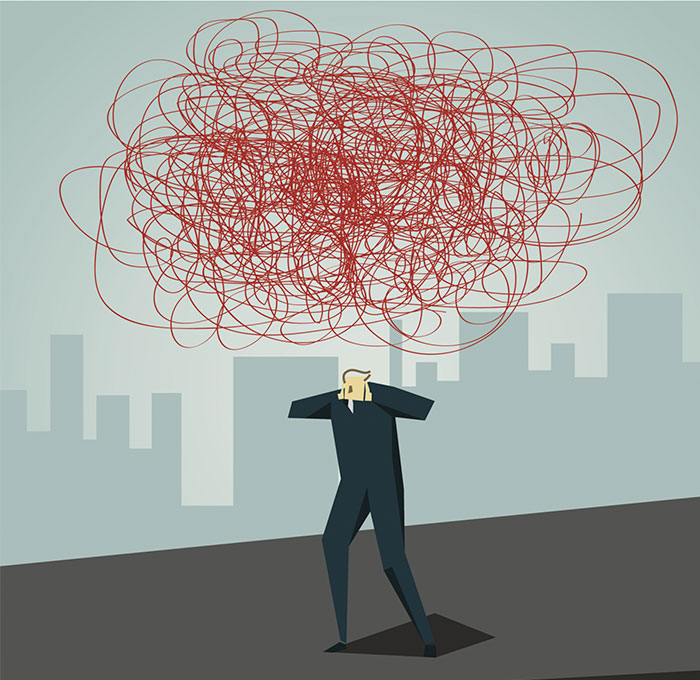
The Real Causes Of Depression Have Been Discovered, And They’re Not What You Think
Across the Western world today, if you are depressed or anxious and you go to your doctor because you just can’t take it anymore, you will likely be told a story. It happened to me when I was a teenager in the 1990s. You feel this way, my doctor said, because your brain isn’t working right. It isn’t producing the necessary chemicals. You need to take drugs, and they will fix your broken brain.
Image credits: iStock
I tried this strategy with all my heart for more than a decade. I longed for relief. The drugs would give me a brief boost whenever I jacked up my dose, but then, soon after, the pain would always start to bleed back through. In the end, I was taking the maximum dose for more than a decade. I thought there was something wrong with me because I was taking these drugs but still feeling deep pain.
In the end, my need for answers was so great that I spent three years using my training in the social sciences at Cambridge University to research what really causes depression and anxiety, and how to really solve them. I was startled by many things I learned. The first was that my reaction to the drugs wasn’t freakish ― it was quite normal.
“Many leading scientists believe the whole idea that depression is caused by a “chemically imbalanced” brain is wrong”
But more than that – I was startled to discover that many leading scientists believe the whole idea that depression is caused by a “chemically imbalanced” brain is wrong. I learned that there are in fact nine major causes of depression and anxiety that are unfolding all around us. Two are biological, and seven are out in here in the world, rather than sealed away inside our skulls in the way my doctor told me. The causes are all quite different, and they play out to different degrees in the lives of depressed and anxious people. I was even more startled to discover this isn’t some fringe position – the World Health Organization has been warning for years that we need to start dealing with the deeper causes of depression in this way.
I want to write here about the hardest of those causes for me, personally, to investigate. The nine causes are all different – but this is one that I left, lingering, trying not to look at, for most of my three years of research. I was finally taught about it in San Diego, California, when I met a remarkable scientist named Dr. Vincent Felitti. I have to tell you right at the start though – I found it really painful to investigate this cause. It forced me to reckon with something I had been running from for most of my life. One of the reasons I clung to the theory that my depression was just the result of something going wrong with my brain was, I see now, so I would not have to think about this.
**
The story of Dr. Felitti’s breakthrough stretches back to the mid-1980s, when it happened almost by accident. At first, it’ll sound like this isn’t a story about depression. But it’s worth following his journey – because it can teach us a lot.
When the patients first came into Felitti’s office, some of them found it hard to fit through the door. They were in the most severe stages of obesity, and they were assigned here, to his clinic, as their last chance. Felitti had been commissioned by the medical provider Kaiser Permanente to figure out how to genuinely solve the company’s exploding obesity costs. Start from scratch, they said. Try anything.
One day, Felitti had a maddening simple idea. He asked: What if these severely overweight people simply stopped eating, and lived off the fat stores they’d built up in their bodies – with monitored nutrition supplements – until they were down to a normal weight? What would happen? Cautiously, they tried it, with a lot of medical supervision – and, startlingly, it worked. The patients were shedding weight, and returning to healthy bodies.
“Once the numbers were added up, they seemed unbelievable”
But then something strange happened. In the program, there were some stars ― people who shed incredible amounts of weight, and the medical team ― and all their friends ― expected these people to react with joy, but the people who did best were often thrown into a brutal depression, or panic, or rage. Some of them became suicidal. Without their bulk, they felt unbelievably vulnerable. They often fled the program, gorged on fast food, and put their weight back on very fast.
Felitti was baffled ― until he talked with one 28-year-old woman. In 51 weeks, Felitti had taken her down from 408 pounds to 132 pounds. Then ― quite suddenly, for no reason anyone could see ― she put on 37 pounds in the space of a few weeks. Before long, she was back above 400 pounds. So Felitti asked her gently what had changed when she started to lose weight. It seemed mysterious to both of them. They talked for a long time. There was, she said eventually, one thing. When she was obese, men never hit on her ― but when she got down to a healthy weight, for the first time in a long time, she was propositioned by a man. She fled, and right away began to eat compulsively, and she couldn’t stop.
This was when Felitti thought to ask a question he hadn’t asked before. When did you start to put on weight? She thought about the question. When she was 11 years old, she said. So he asked: Was there anything else that happened in your life when you were 11? Well, she replied ― that was when my grandfather began to rape me.
As Felitti spoke to the 183 people in the program, he found 55 percent had been sexually abused. One woman said she put on weight after she was raped because “overweight is overlooked, and that’s the way I need to be.” It turned out many of these women had been making themselves obese for an unconscious reason: to protect themselves from the attention of men, who they believed would hurt them. Felitti suddenly realized: “What we had perceived as the problem ― major obesity ― was in fact, very frequently, the solution to problems that the rest of us knew nothing about.”
This insight led Felitti to launch a massive program of research, funded by the Centers For Disease Control and Prevention. He wanted to discover how all kinds of childhood trauma affect us as adults. He administered a simple questionnaire to 17,000 ordinary patients in San Diego, who were were coming just for general health care – anything from a headache to a broken leg. It asked if any of 10 bad things had happened to you as a kid, like being neglected, or emotionally abused. Then it asked if you had any of 10 psychological problems, like obesity or depression or addiction. He wanted to see what the matchup was.
Once the numbers were added up, they seemed unbelievable. Childhood trauma caused the risk of adult depression to explode. If you had seven categories of traumatic event as a child, you were 3,100 percent more likely to attempt to commit suicide as an adult, and more than 4,000 percent more likely to be an injecting drug user.
**
After I had one of my long, probing conversations with Dr. Felitti about this, I walked to the beach in San Diego shaking, and spat into the ocean. He was forcing me to think about a dimension of my depression I did not want to confront. When I was a kid, my mother was ill and my dad was in another country, and in this chaos, I experienced some extreme acts of violence from an adult: I was strangled with an electrical cord, among other acts. I had tried to seal these memories away, to shutter them in my mind. I had refused to contemplate that they were playing out in my adult life.
Why do so many people who experience violence in childhood feel the same way? Why does it lead many of them to self-destructive behavior, like obesity, or hard-core addiction, or suicide? I have spent a lot of time thinking about this. I have a theory – though I want to stress that this next part is going beyond the scientific evidence discovered by Felitti and the CDC, and I can’t say for sure that it’s true.
“If it’s your fault, it’s — at some strange level — under your control”
When you’re a child, you have very little power to change your environment. You can’t move away, or force somebody to stop hurting you. So, you have two choices. You can admit to yourself that you are powerless ― that at any moment, you could be badly hurt, and there’s simply nothing you can do about it. Or you can tell yourself it’s your fault. If you do that, you actually gain some power ― at least in your own mind. If it’s your fault, then there’s something you can do that might make it different. You aren’t a pinball being smacked around a pinball machine. You’re the person controlling the machine. You have your hands on the dangerous levers. In this way, just like obesity protected those women from the men they feared would rape them, blaming yourself for your childhood traumas protects you from seeing how vulnerable you were and are. You can become the powerful one. If it’s your fault, it’s ― at some strange level ― under your control.
Image credits: iStock
But that comes at a cost. If you were responsible for being hurt, then at some level, you have to think you deserved it. A person who thinks they deserved to be injured as a child isn’t going to think they deserve much as an adult, either. This is no way to live. But it’s a misfiring of the thing that made it possible for you to survive at an earlier point in your life.
**
But it was what Dr. Felitti discovered next that most helped me. When ordinary patients, responding to his questionnaire, noted that they had experienced childhood trauma, he got their doctors to do something when the patients next came in for care. He got them to say something like, “I see you went through this bad experience as a child. I am sorry this happened to you. Would you like to talk about it?”
Felitti wanted to see if being able to discuss this trauma with a trusted authority figure, and being told it was not your fault, would help to release people’s shame. What happened next was startling. Just being able to discuss the trauma led to a huge fall in future illnesses ― there was a 35-percent reduction in their need for medical care over the following year. For the people who were referred to more extensive help, there was a fall of more than 50 percent. One elderly woman ― who had described being raped as a child ― wrote a letter later, saying: “Thank you for asking … I feared I would die, and no one would ever know what had happened.”
The act of releasing your shame is – in itself – healing. So I went back to people I trusted, and I began to talk about what had happened to me when I was younger. Far from shaming me, far from thinking it showed I was broken, they showed love, and helped me to grieve for what I had gone through.
“If you find your work meaningless and you feel you have no control over it, you are far more likely to become depressed”
As I listened back over the tapes of my long conversations with Felitti, it struck me that if he had just told people what my doctor told me – that their brains were broken, this was why they were so distressed, and the only solution was to be drugged – they may never have been able to understand the deeper causes of their problem, and they would never have been released from them.
Image credits: iStock
The more I investigated depression and anxiety, the more I found that, far from being caused by a spontaneously malfunctioning brain, depression and anxiety are mostly being caused by events in our lives. If you find your work meaningless and you feel you have no control over it, you are far more likely to become depressed. If you are lonely and feel that you can’t rely on the people around you to support you, you are far more likely to become depressed. If you think life is all about buying things and climbing up the ladder, you are far more likely to become depressed. If you think your future will be insecure, you are far more likely to become depressed. I started to find a whole blast of scientific evidence that depression and anxiety are not caused in our skulls, but by the way many of us are being made to live. There are real biological factors, like your genes, that can make you significantly more sensitive to these causes, but they are not the primary drivers.
And that led me to the scientific evidence that we have to try to solve our depression and anxiety crises in a very different way (alongside chemical anti-depressants, which should of course remain on the table).
To do that, we need to stop seeing depression and anxiety as an irrational pathology, or a weird misfiring of brain chemicals. They are terribly painful – but they make sense. Your pain is not an irrational spasm. It is a response to what is happening to you. To deal with depression, you need to deal with its underlying causes. On my long journey, I learned about seven different kinds of anti-depressants – ones that are about stripping out the causes, rather than blunting the symptoms. Releasing your shame is only the start.
**
One day, one of Dr. Felitti’s colleagues, Dr. Robert Anda, told me something I have been thinking about ever since.
When people are behaving in apparently self-destructive ways, “it’s time to stop asking what’s wrong with them,” he said, “and time to start asking what happened to them.”
More info: Johann’s Book
303Kviews
Share on FacebookI thank the author for his contribution; imo, any discussion about mental health is positive and helps to fight the stigma associated to it. However, I fail to see what is revolutionary about his input here. Depression and anxiety, as being caused by exogenous and endogenous factors, has been discussed since I can remember. Of course a traumatic event, particularly in your developing years, will dramatically increase the chances of developing mental issues later in life. I also don't understand why an exogenous cause (prolonged or intense trauma, like sexual or physical abuse, bullying, a personal loss, etc.), cannot lead to a chemical alteration in your brain. Thus, creating also the endogenous factor: the chemical imbalance. Both are not incompatible.
Thank you for that! Let's also remember that most people who suffer depression had no childhood trauma at all.
Load More Replies...I’m actually flabbergasted that any of this is regarded as new information. Is there such a big difference between US and European psychiatry? Here in the Netherlands talking about what troubles you and digging out the roots of your depression is ALWAYS the first step. Medication is mostly viewed as an aid to help you overcome the effects of depression in your daily life, not as the solution.
Seriously. Bored Panda finds the most useless things to say "groundbreaking" or "new information" about
Load More Replies...I am on prescribed antidepressants. It has helped me a lot. Hope noone will stop taking it because some article on boredpand.com. Period.
He didn't say to stop taking the antidepressants. He just said that the path to healing also involves opening up to others about personal trauma.
Load More Replies...I thank the author for his contribution; imo, any discussion about mental health is positive and helps to fight the stigma associated to it. However, I fail to see what is revolutionary about his input here. Depression and anxiety, as being caused by exogenous and endogenous factors, has been discussed since I can remember. Of course a traumatic event, particularly in your developing years, will dramatically increase the chances of developing mental issues later in life. I also don't understand why an exogenous cause (prolonged or intense trauma, like sexual or physical abuse, bullying, a personal loss, etc.), cannot lead to a chemical alteration in your brain. Thus, creating also the endogenous factor: the chemical imbalance. Both are not incompatible.
Thank you for that! Let's also remember that most people who suffer depression had no childhood trauma at all.
Load More Replies...I’m actually flabbergasted that any of this is regarded as new information. Is there such a big difference between US and European psychiatry? Here in the Netherlands talking about what troubles you and digging out the roots of your depression is ALWAYS the first step. Medication is mostly viewed as an aid to help you overcome the effects of depression in your daily life, not as the solution.
Seriously. Bored Panda finds the most useless things to say "groundbreaking" or "new information" about
Load More Replies...I am on prescribed antidepressants. It has helped me a lot. Hope noone will stop taking it because some article on boredpand.com. Period.
He didn't say to stop taking the antidepressants. He just said that the path to healing also involves opening up to others about personal trauma.
Load More Replies...
 Image credits:
Image credits: 




254
122